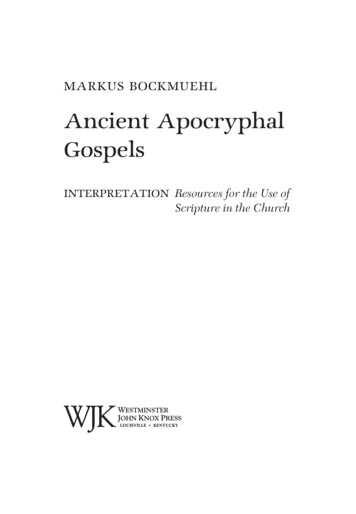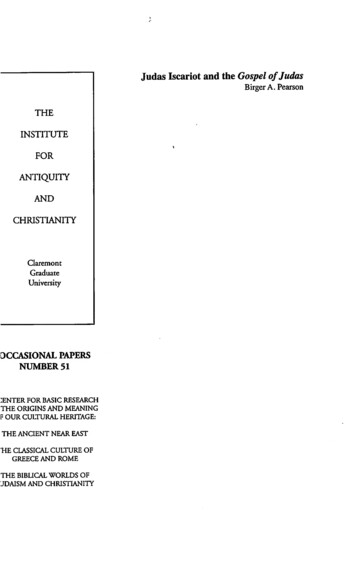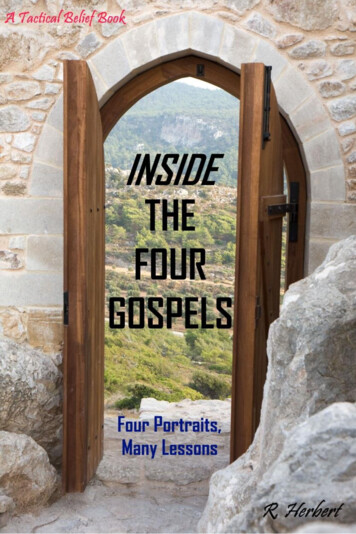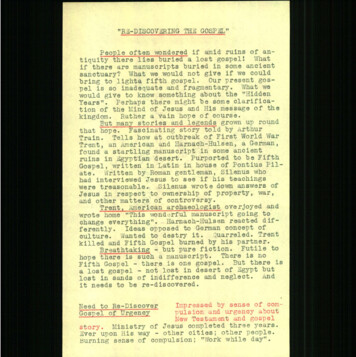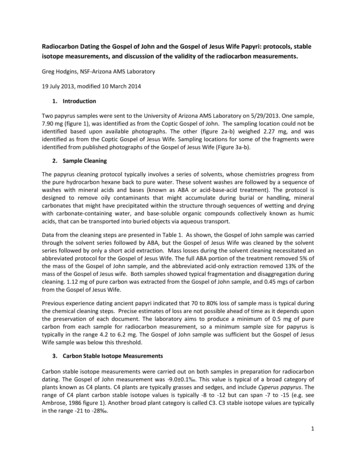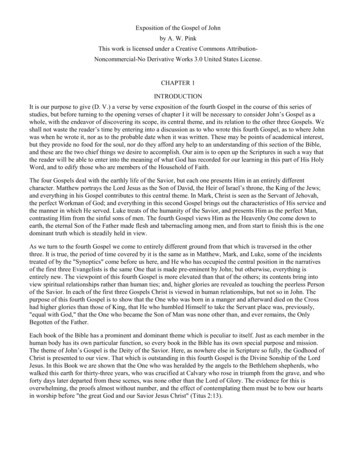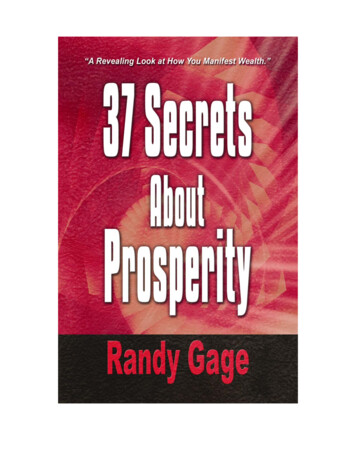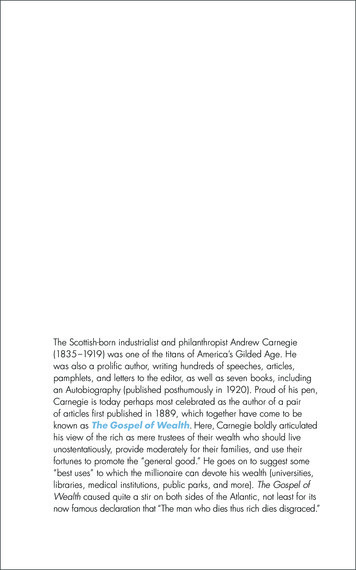
Transcription
The Scottish-born industrialist and philanthropist Andrew Carnegie(1835 –1919) was one of the titans of America’s Gilded Age. Hewas also a prolific author, writing hundreds of speeches, articles,pamphlets, and letters to the editor, as well as seven books, includingan Autobiography (published posthumously in 1920). Proud of his pen,Carnegie is today perhaps most celebrated as the author of a pairof articles first published in 1889, which together have come to beknown as The Gospel of Wealth. Here, Carnegie boldly articulatedhis view of the rich as mere trustees of their wealth who should liveunostentatiously, provide moderately for their families, and use theirfortunes to promote the “general good.” He goes on to suggest some“best uses” to which the millionaire can devote his wealth (universities,libraries, medical institutions, public parks, and more). The Gospel ofWealth caused quite a stir on both sides of the Atlantic, not least for itsnow famous declaration that “The man who dies thus rich dies disgraced.”
The Gospelof Wealth
Two articles originally publishedin The North American ReviewJune 1889 & December 1889
The Gospelof WealthAndrew CarnegieNEW YORKCARNEGIE CORPORATION OF NEW YORK2017
I.WEALTHhe problem of our age is theproper administration of wealth, so that the ties of brotherhood may still bind together the rich and poor in harmoniousrelationship. The conditions of human life have not only beenchanged, but revolutionized, within the past few hundred years.In former days there was little difference between the dwelling, dress, food, and environment of the chief and those of hisretainers. The Indians are today where civilized man then was.When visiting the Sioux, I was led to the wigwam of the chief. Itwas just like the others in external appearance, and even withinthe difference was trifling between it and those of the poorestof his braves. The contrast between the palace of the millionaire and the cottage of the laborer with us today measures thechange which has come with civilization.This change, however, is not to be deplored, but welcomed ashighly beneficial. It is well, nay, essential for the progress of therace, that the houses of some should be homes for all that ishighest and best in literature and the arts, and for all the refinements of civilization, rather than that none should be so. Muchbetter this great irregularity than universal squalor. Withoutwealth there can be no Maecenas. The “good old times” were notgood old times. Neither master nor servant was as well situatedthen as today. A relapse to old conditions would be disastrousto both —not the least so to him who serves —and would sweepTHE GOSPEL OF WEALTH1
away civilization with it. But whether the change be for good orill, it is upon us, beyond our power to alter, and therefore to beaccepted and made the best of. It is a waste of time to criticizethe inevitable.It is easy to see how the change has come. One illustration willserve for almost every phase of the cause. In the manufacture ofproducts we have the whole story. It applies to all combinationsof human industry, as stimulated and enlarged by the inventionsof this scientific age. Formerly articles were manufactured atthe domestic hearth or in small shops which formed part of thehousehold. The master and his apprentices worked side by side,the latter living with the master, and therefore subject to thesame conditions. When these apprentices rose to be masters,there was little or no change in their mode of life, and they, inturn, educated in the same routine succeeding apprentices.There was, substantially, social equality, and even politicalequality, for those engaged in industrial pursuits had then littleor no political voice in the State.But the inevitable result of such a mode of manufacture wascrude articles at high prices. Today the world obtains commodities of excellent quality at prices which even the generationpreceding this would have deemed incredible. In the commercial world similar causes have produced similar results, and therace is benefited thereby. The poor enjoy what the rich could notbefore afford. What were the luxuries have become the necessaries of life. The laborer has now more comforts than the farmerhad a few generations ago. The farmer has more luxuries thanthe landlord had, and is more richly clad and better housed. Thelandlord has books and pictures rarer, and appointments moreartistic, than the King could then obtain.The price we pay for this salutary change is, no doubt, great. Weassemble thousands of operatives in the factory, in the mine,2
and in the countinghouse, of whom the employer can knowlittle or nothing, and to whom the employer is little better thana myth. All intercourse between them is at an end. Rigid Castesare formed, and, as usual, mutual ignorance breeds mutualdistrust. Each Caste is without sympathy for the other, andready to credit anything disparaging in regard to it. Under thelaw of competition, the employer of thousands is forced into thestrictest economies, among which the rates paid to labor figureprominently, and often there is friction between the employerand the employed, between capital and labor, between rich andpoor. Human society loses homogeneity.The price which society pays for the law of competition, like theprice it pays for cheap comforts and luxuries, is also great; butthe advantages of this law are also greater still, for it is to thislaw that we owe our wonderful material development, whichbrings improved conditions in its train. But, whether the lawbe benign or not, we must say of it, as we say of the change inthe conditions of men to which we have referred: It is here; wecannot evade it; no substitutes for it have been found; and whilethe law may be sometimes hard for the individual, it is best forthe race, because it insures the survival of the fittest in everydepartment. We accept and welcome, therefore, as conditionsto which we must accommodate ourselves, great inequalityof environment, the concentration of business, industrial andcommercial, in the hands of a few, and the law of competitionbetween these, as being not only beneficial, but essential for thefuture progress of the race. Having accepted these, it followsthat there must be great scope for the exercise of special abilityin the merchant and in the manufacturer who has to conductaffairs upon a great scale. That this talent for organizationand management is rare among men is proved by the fact thatit invariably secures for its possessor enormous rewards, nomatter where or under what laws or conditions. The experiencedin affairs always rate the man whose services can be obtainedTHE GOSPEL OF WEALTH3
as a partner as not only the first consideration, but such as torender the question of his capital scarcely worth considering, forsuch men soon create capital; while, without the special talentrequired, capital soon takes wings. Such men become interestedin firms or corporations using millions; and estimating onlysimple interest to be made upon the capital invested, it is inevitable that their income must exceed their expenditures, and thatthey must accumulate wealth. Nor is there any middle groundwhich such men can occupy, because the great manufacturing orcommercial concern which does not earn at least interest uponits capital soon becomes bankrupt. It must either go forward orfall behind: to stand still is impossible. It is a condition essentialfor its successful operation that it should be thus far profitable,and even that, in addition to interest on capital, it should makeprofit. It is a law, as certain as any of the others named, thatmen possessed of this peculiar talent for affairs, under the freeplay of economic forces, must, of necessity, soon be in receiptof more revenue than can be judiciously expended upon themselves; and this law is as beneficial for the race as the others.Objections to the foundations upon which society is based arenot in order, because the condition of the race is better withthese than it has been with any others which have been tried.Of the effect of any new substitutes proposed we cannot besure. The Socialist or Anarchist who seeks to overturn present conditions is to be regarded as attacking the foundationupon which civilization itself rests, for civilization took its startfrom the day that the capable, industrious workman said to hisincompetent and lazy fellow, “If thou dost not sow, thou shaltnot reap,” and thus ended primitive Communism by separating the drones from the bees. One who studies this subject willsoon be brought face to face with the conclusion that upon thesacredness of property civilization itself depends —the rightof the laborer to his hundred dollars in the savings bank, andequally the legal right of the millionaire to his millions. To4
those who propose to substitute Communism for this intenseIndividualism the answer, therefore, is: The race has tried that.All progress from that barbarous day to the present time hasresulted from its displacement. Not evil, but good, has come tothe race from the accumulation of wealth by those who have theability and energy that produce it. But even if we admit for amoment that it might be better for the race to discard its presentfoundation, Individualism—that it is a nobler ideal that manOur duty is with what ispracticable now; withthe next step possible inour day and generation.should labor, not for himself alone, but in and for a brotherhoodof his fellows, and share with them all in common, realizingSwedenborg’s idea of Heaven, where, as he says, the angelsderive their happiness, not from laboring for self, but for eachother —even admit all this, and a sufficient answer is, This is notevolution, but revolution. It necessitates the changing of humannature itself —a work of eons, even if it were good to change it,which we cannot know. It is not practicable in our day or in ourage. Even if desirable theoretically, it belongs to another andlong-succeeding sociological stratum. Our duty is with whatis practicable now; with the next step possible in our day andgeneration. It is criminal to waste our energies in endeavoring touproot, when all we can profitably or possibly accomplish is tobend the universal tree of humanity a little in the direction mostfavorable to the production of good fruit under existing circumstances. We might as well urge the destruction of the highestTHE GOSPEL OF WEALTH5
existing type of man because he failed to reach our ideal as tofavor the destruction of Individualism, Private Property, theLaw of Accumulation of Wealth, and the Law of Competition;for these are the highest results of human experience, the soilin which society so far has produced the best fruit. Unequally orunjustly, perhaps, as these laws sometimes operate, and imperfect as they appear to the Idealist, they are, nevertheless, likethe highest type of man, the best and most valuable of all thathumanity has yet accomplished.We start, then, with a condition of affairs under which the bestinterests of the race are promoted, but which inevitably giveswealth to the few. Thus far, accepting conditions as they exist,the situation can be surveyed and pronounced good. The question then arises —and, if the foregoing be correct, it is the onlyquestion with which we have to deal —What is the proper modeof administering wealth after the laws upon which civilizationis founded have thrown it into the hands of the few? And it is ofthis great question that I believe I offer the true solution. It willbe understood that fortunes are here spoken of, not moderatesums saved by many years of effort, the returns from whichare required for the comfortable maintenance and educationof families. This is not wealth, but only competence, which itshould be the aim of all to acquire.There are but three modes in which surplus wealth can bedisposed of. It can be left to the families of the decedents; orit can be bequeathed for public purposes; or, finally, it can beadministered during their lives by its possessors. Under thefirst and second modes most of the wealth of the world thathas reached the few has hitherto been applied. Let us in turnconsider each of these modes. The first is the most injudicious.In monarchical countries, the estates and the greatest portion ofthe wealth are left to the first son, that the vanity of the parentmay be gratified by the thought that his name and title are to6
descend to succeeding generations unimpaired. The conditionof this class in Europe today teaches the futility of such hopes orambitions. The successors have become impoverished throughtheir follies or from the fall in the value of land. Even in GreatBritain the strict law of entail has been found inadequate tomaintain the status of a hereditary class. Its soil is rapidly passing into the hands of the stranger. Under republican institutionsthe division of property among the children is much fairer,but the question which forces itself upon thoughtful men in alllands is: Why should men leave great fortunes to their children?If this is done from affection, is it not misguided affection?Observation teaches that, generally speaking, it is not wellfor the children that they should be so burdened. Neither is itwell for the state. Beyond providing for the wife and daughtersmoderate sources of income, and very moderate allowancesindeed, if any, for the sons, men may well hesitate, for it is nolonger questionable that great sums bequeathed oftener workmore for the injury than for the good of the recipients. Wise menwill soon conclude that, for the best interests of the members oftheir families and of the state, such bequests are an improperuse of their means.It is not suggested that men who have failed to educate their sonsto earn a livelihood shall cast them adrift in poverty. If any manhas seen fit to rear his sons with a view to their living idle lives,or, what is highly commendable, has instilled in them the sentiment that they are in a position to labor for public ends withoutreference to pecuniary considerations, then, of course, the dutyof the parent is to see that such are provided for in moderation.There are instances of millionaires’ sons unspoiled by wealth,who, being rich, still perform great services in the community.Such are the very salt of the earth, as valuable as, unfortunately,they are rare; still it is not the exception, but the rule, that menmust regard, and, looking at the usual result of enormous sumsconferred upon legatees, the thoughtful man must shortly say,THE GOSPEL OF WEALTH7
“I would as soon leave to my son a curse as the almighty dollar,”and admit to himself that it is not the welfare of the children, butfamily pride, which inspires these enormous legacies.As to the second mode, that of leaving wealth at death for publicuses, it may be said that this is only a means for the disposal ofwealth, provided a man is content to wait until he is dead beforeit becomes of much good in the world. Knowledge of the resultsof legacies bequeathed is not calculated to inspire the brightesthopes of much posthumous good being accomplished. The casesare not few in which the real object sought by the testator is notattained, nor are they few in which his real wishes are thwarted.In many cases the bequests are so used as to become onlymonuments of his folly. It is well to remember that it requiresthe exercise of not less ability than that which acquired thewealth to use it so as to be really beneficial to the community.Besides this, it may fairly be said that no man is to be extolledfor doing what he cannot help doing, nor is he to be thanked bythe community to which he only leaves wealth at death. Menwho leave vast sums in this way may fairly be thought men whowould not have left it at all, had they been able to take it withthem. The memories of such cannot be held in grateful remembrance, for there is no grace in their gifts. It is not to be wonderedat that such bequests seem so generally to lack the blessing.The growing disposition to tax more and more heavily largeestates left at death is a cheering indication of the growth of asalutary change in public opinion. The State of Pennsylvanianow takes —subject to some exceptions —one-tenth of theproperty left by its citizens. The budget presented in the BritishParliament the other day proposes to increase the death duties;and, most significant of all, the new tax is to be a graduatedone. Of all forms of taxation, this seems the wisest. Men whocontinue hoarding great sums all their lives, the proper useof which for public ends would work good to the community,8
should be made to feel that the community, in the form of thestate, cannot thus be deprived of its proper share. By taxingestates heavily at death the state marks its condemnation of theselfish millionaire’s unworthy life.It is desirable that nations should go much further in this direction. Indeed, it is difficult to set bounds to the share of a richman’s estate which should go at his death to the public throughthe agency of the state, and by all means such taxes should begraduated, beginning at nothing upon moderate sums to dependents, and increasing rapidly as the amounts swell, until of themillionaire’s hoard, as of Shylock’s, at leastThe other halfComes to the privy coffer of the state.This policy would work powerfully to induce the rich man toattend to the administration of wealth during his life, which isthe end that society should always have in view, as being thatby far most fruitful for the people. Nor need it be feared thatthis policy would sap the root of enterprise and render men lessanxious to accumulate, for to the class whose ambition it is toleave great fortunes and be talked about after their death, it willattract even more attention, and, indeed, be a somewhat noblerambition to have enormous sums paid over to the state fromtheir fortunes.There remains, then, only one mode of using great fortunes;but in this we have the true antidote for the temporary unequaldistribution of wealth, the reconciliation of the rich and thepoor —a reign of harmony —another ideal, differing, indeed,from that of the Communist in requiring only the furtherevolution of existing conditions, not the total overthrow of ourcivilization. It is founded upon the present most intense individualism, and the race is prepared to put it in practice by degreeswhenever it pleases. Under its sway we shall have an ideal state,THE GOSPEL OF WEALTH9
in which the surplus wealth of the few will become, in the bestsense, the property of the many, because administered for thecommon good, and this wealth, passing through the hands ofthe few, can be made a much more potent force for the elevationof our race than if it had been distributed in small sums to thepeople themselves. Even the poorest can be made to see this,and to agree that great sums gathered by some of their fellowcitizens and spent for public purposes, from which the massesreap the principal benefit, are more valuable to them than ifscattered among them through the course of many years intrifling amounts.If we consider what results flow from the Cooper Institute,for instance, to the best portion of the race in New York notpossessed of means, and compare these with those which wouldhave arisen for the good of the masses from an equal sumdistributed by Mr. Cooper in his lifetime in the form of wages,which is the highest form of distribution, being for work doneand not for charity, we can form some estimate of the possibilities for the improvement of the race which lie embedded in thepresent law of the accumulation of wealth. Much of this sum, ifdistributed in small quantities among the people, would havebeen wasted in the indulgence of appetite, some of it in excess,and it may be doubted whether even the part put to the best use,that of adding to the comforts of the home, would have yieldedresults for the race, as a race, at all comparable to those whichare flowing and are to flow from the Cooper Institute fromgeneration to generation. Let the advocate of violent or radicalchange ponder well this thought.We might even go so far as to take another instance, that of Mr.Tilden’s bequest of five millions of dollars for a free library inthe city of New York, but in referring to this one cannot helpsaying involuntarily, How much better if Mr. Tilden had devotedthe last years of his own life to the proper administration of this10
immense sum; in which case neither legal contest nor any othercause of delay could have interfered with his aims. But let usassume that Mr. Tilden’s millions finally become the means ofgiving to this city a noble public library, where the treasures ofthe world contained in books will be open to all forever, withoutmoney and without price. Considering the good of that part ofthe race which congregates in and around Manhattan Island,would its permanent benefit have been better promoted hadthese millions been allowed to circulate in small sums throughthe hands of the masses? Even the most strenuous advocate ofCommunism must entertain a doubt upon this subject. Most ofthose who think will probably entertain no doubt whatever.Poor and restricted are our opportunities inthis life; narrow our horizon; our best workmost imperfect; but rich men should be thankfulfor one inestimable boon. They have it in theirpower during their lives to busy themselves inorganizing benefactions from which the massesof their fellows will derive lasting advantage,and thus dignify their own lives.Poor and restricted are our opportunities in this life; narrow ourhorizon; our best work most imperfect; but rich men should bethankful for one inestimable boon. They have it in their powerduring their lives to busy themselves in organizing benefactions from which the masses of their fellows will derive lastingadvantage, and thus dignify their own lives. The highest lifeis probably to be reached, not by such imitation of the life ofChrist as Count Tolstoy gives us, but, while animated by Christ’sspirit, by recognizing the changed conditions of this age, andTHE GOSPEL OF WEALTH11
adopting modes of expressing this spirit suitable to the changedconditions under which we live; still laboring for the good ofour fellows, which was the essence of his life and teaching, butlaboring in a different manner.This, then, is held to be the duty of the man of Wealth: First,to set an example of modest, unostentatious living, shunningdisplay or extravagance; to provide moderately for the legitimate wants of those dependent upon him; and after doing soto consider all surplus revenues which come to him simply astrust funds, which he is called upon to administer, and strictlybound as a matter of duty to administer in the manner which, inhis judgment, is best calculated to produce the most beneficialresults for the community —the man of wealth thus becomingthe mere agent and trustee for his poorer brethren, bringingto their service his superior wisdom, experience, and ability toadminister, doing for them better than they would or could dofor themselves.We are met here with the difficulty of determining what aremoderate sums to leave to members of the family; what ismodest, unostentatious living; what is the test of extravagance.There must be different standards for different conditions. Theanswer is that it is as impossible to name exact amounts oractions as it is to define good manners, good taste, or the rulesof propriety; but, nevertheless, these are verities, well knownalthough undefinable. Public sentiment is quick to know andto feel what offends these. So in the case of wealth. The rule inregard to good taste in the dress of men or women applies here.Whatever makes one conspicuous offends the canon. If anyfamily be chiefly known for display, for extravagance in home,table, equipage, for enormous sums ostentatiously spent inany form upon itself —if these be its chief distinctions, we haveno difficulty in estimating its nature or culture. So likewise inregard to the use or abuse of its surplus wealth, or to generous,12
free-handed cooperation in good public uses, or to unabatedefforts to accumulate and hoard to the last, whether theyadminister or bequeath. The verdict rests with the best and mostenlightened public sentiment. The community will surely judge,and its judgments will not often be wrong.The best uses to which surplus wealth can be put have alreadybeen indicated. Those who would administer wisely must,indeed, be wise, for one of the serious obstacles to the improvement of our race is indiscriminate charity. It were better formankind that the millions of the rich were thrown into the seathan so spent as to encourage the slothful, the drunken, theunworthy. Of every thousand dollars spent in so called charity today, it is probable that 950 is unwisely spent; so spent,indeed, as to produce the very evils which it proposes to mitigate or cure. A well-known writer of philosophic books admittedthe other day that he had given a quarter of a dollar to a manwho approached him as he was coming to visit the house ofhis friend. He knew nothing of the habits of this beggar; knewnot the use that would be made of this money, although hehad every reason to suspect that it would be spent improperly.This man professed to be a disciple of Herbert Spencer; yet thequarter dollar given that night will probably work more injurythan all the money which its thoughtless donor will ever be ableto give in true charity will do good. He only gratified his ownfeelings, saved himself from annoyance —and this was probablyone of the most selfish and very worst actions of his life, for inall respects he is most worthy.In bestowing charity, the main consideration should be to helpthose who will help themselves; to provide part of the meansby which those who desire to improve may do so; to give thosewho desire to rise the aids by which they may rise; to assist, butrarely or never to do all. Neither the individual nor the race isimproved by almsgiving. Those worthy of assistance, exceptTHE GOSPEL OF WEALTH13
in rare cases, seldom require assistance. The really valuablemen of the race never do, except in cases of accident or suddenchange. Everyone has, of course, cases of individuals brought tohis own knowledge where temporary assistance can do genuinegood, and these he will not overlook. But the amount which canbe wisely given by the individual for individuals is necessarilylimited by his lack of knowledge of the circumstances connectedwith each. He is the only true reformer who is as careful and asanxious not to aid the unworthy as he is to aid the worthy, and,perhaps, even more so, for in almsgiving more injury is probablydone by rewarding vice than by relieving virtue.There is no mode of disposingof surplus wealth creditableto thoughtful and earnest meninto whose hands it flows saveby using it year by year forthe general good.The rich man is thus almost restricted to following the examples of Peter Cooper, Enoch Pratt of Baltimore, Mr. Pratt ofBrooklyn, Senator Stanford, and others, who know that the bestmeans of benefiting the community is to place within its reachthe ladders upon which the aspiring can rise —parks, and meansof recreation, by which men are helped in body and mind; worksof art, certain to give pleasure and improve the public taste;and public institutions of various kinds, which will improve thegeneral condition of the people; in this manner returning their14
surplus wealth to the mass of their fellows in the forms bestcalculated to do them lasting good.Thus is the problem of Rich and Poor to be solved. The lawsof accumulation will be left free; the laws of distribution free.Individualism will continue, but the millionaire will be but atrustee for the poor; entrusted for a season with a great part ofthe increased wealth of the community, but administering itfor the community far better than it could or would have donefor itself. The best minds will thus have reached a stage in thedevelopment of the race in which it is clearly seen that there isno mode of disposing of surplus wealth creditable to thoughtful and earnest men into whose hands it flows save by using ityear by year for the general good. This day already dawns. Buta little while, and although, without incurring the pity of theirfellows, men may die sharers in great business enterprises fromwhich their capital cannot be or has not been withdrawn, andis left chiefly at death for public uses, yet the man who diesleaving behind him millions of available wealth, which was histo administer during life, will pass away “unwept, unhonored,and unsung,” no matter to what uses he leaves the dross whichhe cannot take with him. Of such as these the public verdict willthen be: “The man who dies thus rich dies disgraced.”Such, in my opinion, is the true Gospel concerning Wealth,obedience to which is destined someday to solve the problem ofthe Rich and the Poor, and to bring “Peace on earth, among menGood Will.”THE GOSPEL OF WEALTH15
II.THE BEST FIELDS FOR PHILANTHROPYhe reception given to the firstpaper upon this subject, to which our lamented friend, thelate editor and proprietor of this Review, was pleased to givethe first place in the June number, has been most encouragingto its author, as it would surely have been to the editor hadhe been spared, for he was most deeply interested in the subject.As showing the unflagging attention which Mr. Rice bestowedupon his editorial duties, it may be permissible to tell thatthe manuscript reached him in the morning, and late in theevening of the same day he called to say that it pleased him somuch that he had determined to publish it in the forthcomingnumber, instead of holding it for the succeeding issue, ashad been intended. When urged to delay publication, thatproper time might be given for revision, he declined. Had hecomplied, another than he, alas! wo
pamphlets, and letters to the editor, as well as seven books, including an Autobiography (published posthumously in 1920). Proud of his pen, Carnegie is today perhaps most celebrated as the author of a pair of articles first published in 1889, which together have come to be known as The Gos



